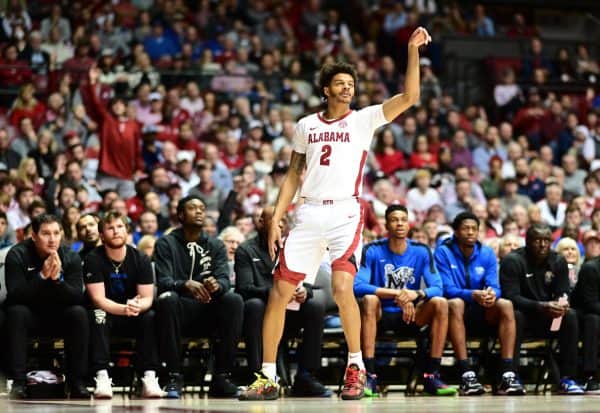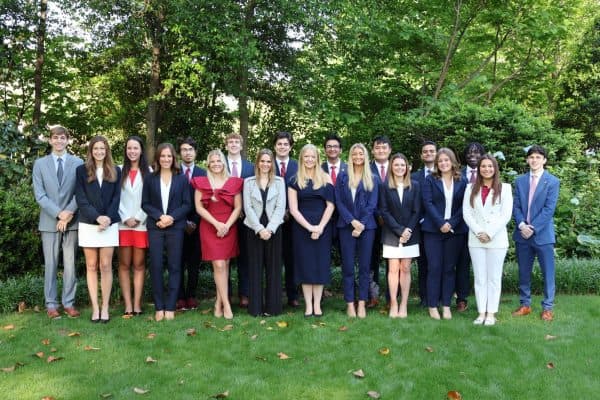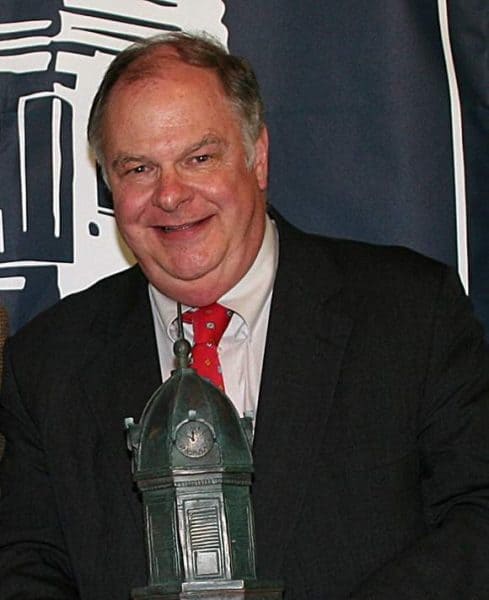Elections Board dismisses Alpha Phi video complaint; says Dobbs was ‘unaware’
SGA President-elect Collier Dobbs debates at the SGA Candidate Forum on Feb. 26, 2023
March 6, 2023
The Student Government Association Elections Board dismissed a complaint of election fraud against President-elect Collier Dobbs that dealt with a video of a member of Alpha Phi sorority voting while referring to endorsements made by her sorority in a chapter member class GroupMe, then sending voter confirmation to an unknown Gmail account.
In its decision, which has not been posted on the SGA website, the Elections Board said that Dobbs’ responsibilities under sections XIV.A and XIV.B of the Elections Manual, which deals with endorsements, were nullified due to Dobbs’ lack of knowledge of the Alpha Phi messages. However, the complaint against Dobbs, which was filed by Aaron Glidden, cited section XII, which deals with campaign ethics and XIII, which deals with election fraud.
In the complaint, Glidden said “the video also shows the same alpha phi voting for Collier Dobbs, the endorsed candidate, and screenshotting her confirmation of voting before sending it to someone with the caption ‘got confirmation before 10:00 AM.’ This is reason to believe that Alpha Phi is requiring members to prove that they voted. This is in clear violation of the elections manual code on campaign ethics and election fraud.”
Section XII.C of the Elections Manual, which deals with campaign ethics, states that “Tampering or interfering with campus elections or an individual’s right to vote in the same is strongly prohibited.”
“These prohibited actions include asking or requiring someone to provide evidence of voting for a particular candidate or issue; coercing or using valuable incentives to induce an individual to vote for a particular candidate or issue; or taking detrimental actions against an individual who refuses to vote for a particular candidate or issue,” the manual goes on to say.
Section XIII states that election fraud includes “Tampering or interfering with an election or a student’s right to vote in the same, including, but not limited to, requiring someone to provide evidence of voting in an election.”
The board’s decision did not address the claims of election fraud or campaign ethics made by Glidden and solely discussed XIV.A and XIV.B.
“The Dobbs violation is being dismissed because Alpha Phi did not contact the Dobbs campaign before making any endorsement announcement and Dobbs was unaware that voter confirmation may have been requested from Alpha Phi members, thereby nullifying his responsibility according to EC XIV.A and XIV.B,” the board’s ruling read.
XIV.A of the Elections Manual states that “Only UA students eligible to vote in an SGA election or groups comprised exclusively of UA students eligible to vote may, with prior approval of the candidate, publicly endorse a candidate.” XIV.B outlines the rule about including a specific disclaimer statement in public endorsements by registered organizations on campus.
The ruling runs contrary to previous rulings made against other campaigns this election cycle. John Richardson, Dobbs’ opponent in the presidential election, was found to have violated endorsement rules in a ruling by the Elections Board last week, despite the organization in question not telling him of their plans to post endorsements.
According to the complaints filed against him, the Instagram account for the College of Arts and Sciences Ambassadors posted an Instagram post and an Instagram story supporting Richardson without the required disclaimer as outlined in the Elections Manual.
“The Elections Manual explicitly states that any student can commit a campaign violation, and therefore, it is the responsibility of the candidate to communicate the election guidelines to their campaign team and supporters,” the board said in two 7-0 rulings against Richardson, one for the Instagram post and one for the Instagram story, despite Richardson saying he was not contacted about the endorsement prior to the posts. Richardson received 1.5 points for each violation.
According to a recording of the hearing, emails from Richardson’s campaign manager to the Elections Board and screenshots of text messages provided by the Richardson campaign, the Arts and Sciences Ambassadors never contacted Richardson about an endorsement, nor did Richardson ask for one. Once they made the post, Richardson asked them within minutes to remove it and add the required disclaimer. According to text messages, the post was “archived” by 11:04 a.m., 13 minutes after it was originally posted at 10:51 a.m.
The screenshots of the Alpha Phi GroupMe that was at the center of the complaint against Dobbs did not appear to have the endorsement statement required for most endorsements, however, the manual only requires them for public endorsements. The manual does not define what is considered to be a public endorsement. Other enhanced screenshots of the video appear to show Alpha Phi endorsing Collier Dobbs, but The Crimson White was unable to verify this due to the low quality of the images.
Additionally, Arts & Sciences Senate candidate Jordan Suttles was disqualified following complaints of campaign ethics and election fraud violations when his former campaign manager was connected to an anonymous Instagram account that left disparaging comments on Dobbs’ and Executive Vice President-elect Josie Schmitt’s Instagram posts. Suttles had already won a Senate seat at the time he was disqualified.
Although Suttles said he had no knowledge of his campaign manager’s actions, the Board wrote in its decision, “The Board’s decision reaffirms the Board’s view that any student, regardless of their position or involvement in the campaign, can commit an election violation.”
Glidden said he plans to appeal the decision to the Judicial Board.











